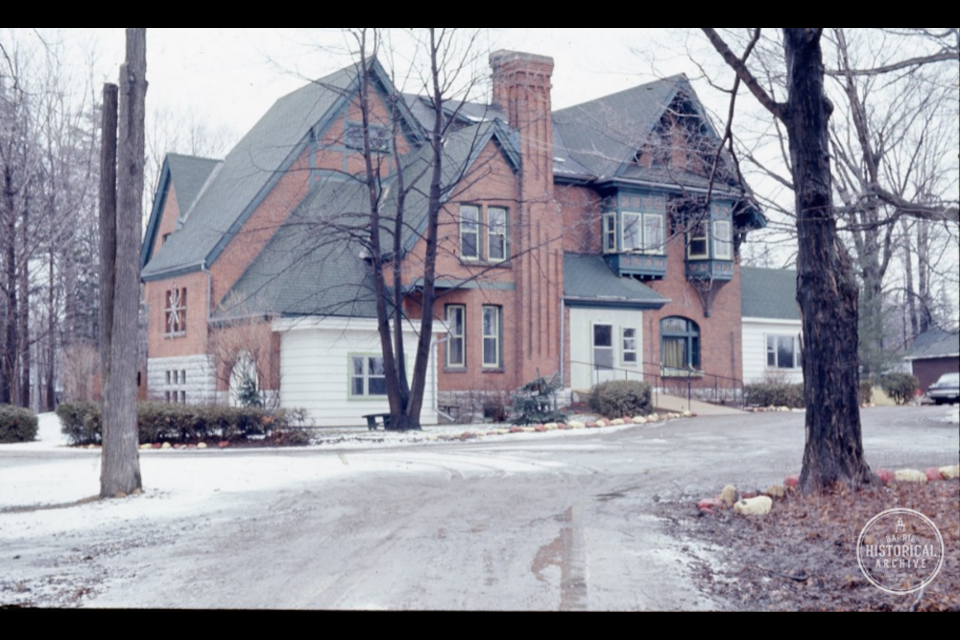Sir John A. Macdonald was a regular visitor to Barrie. These appearances in town weren’t splashed across the front page of the local papers. They were private affairs.
The prime minister’s inner political circle included two prominent Barrie lawyers and these connections led to marriages that made the trio into in-laws.
Macdonald’s private secretary, Hewitt Bernard, became the prime minister’s brother-in-law when Macdonald married Bernard’s sister, Agnes. The Bernard family had arrived in Barrie after the demise of their sugar plantation in Jamaica and the sudden death of the family patriarch.
Meanwhile, D’Alton McCarthy, another passionately Conservative Barrie-based lawyer, was rising rapidly in political spheres. He married Emma Lally, the daughter of Edmund S. Lally, in 1867. Mr. Lally had worn many hats in the early days of Barrie – justice of the peace, banker and military man and more.
In 1870, Emma died. One year later, Emma’s sister, Agnes, was widowed. Her husband, Richard Bernard, was a brother of Hewitt Bernard and Agnes Macdonald, the First Lady of Canada. In 1873, D’Alton McCarthy married his late wife’s sister creating a quite cozy and confusing family group.
Sir John A. Macdonald wasn’t the only prime minister to make family visits to Barrie.
Jennie King married widowed bank manager, Harry Lay, in 1906. The pair lived in several towns in Ontario before Harry was transferred to Barrie in 1919 and it was here that they remained.
Harry Lay had some interesting family members. His father had been the first British Inspector of Chinese Customs while his mother was reportedly the first white female born in Malaysia. Harry Lay’s maternal grandfather was an Oxford educated missionary who spent much of his time in China translating classic books.
However, Harry’s lineage, as impressive as it was, might have some competition from Jennie’s ancestry. Jennie’s grandfather was the fiery Scotsman, William Lyon MacKenzie, printer, rebel leader, mayor of Toronto, and MLA for Upper Canada. In fact, Jennie’s mother had been born in the United States where MacKenzie had fled after the failed Upper Canada Rebellion of 1837. Samuel Lount, another participant, had tried to flee as well, but was captured and eventually hanged for treason.
MacKenzie may have had aspirations of sitting in the prime minister’s chair, but his many exploits, riots, attempted coups, and expulsions from government made his chances slim. That prize would have to wait for another generation to come along.
Isabel Grace, one of MacKenzie’s 14 children, married barrister John Edgar King. They became the parents of Isabel, Dougall, Janet (Jennie), and William Lyon MacKenzie King.
William King, as we know, became the longest-serving prime minister in Canadian history. It is interesting that he attained that office. Although he was highly educated and had great connections, he was known to be without much charisma, a less-than-stellar orator, and tended to be cool and introverted.
When William King became prime minister in 1921, he was unmarried and lacked an official hostess, the role that usually fell to the first lady. He was extraordinarily close to his sister, Jennie Lay, and she filled the position as much as she could. Jennie was often at her brother’s side as he entertained royalty and international heads of state during his long career.
The King siblings were advisors to each other. Jennie gave her opinion on political issues, if asked, and William guided and supported his sister throughout her life. It was William King, while on a visit to Barrie, who suggested that Harry Lay’s passion for horticulture could be turned into a successful business, thus the Boulderfel plant nursery was born.
Aside from Jennie, and his political allies, William King had some unusual confidants. Since the early 1920s, William King had been obsessed with spiritualism, enjoying seances, ouija board sessions and medium led chats with his late mother, brother and his favourite and long-departed dog, Pat.
If the people of Canada had learned about his unique interests during his political years, William King would have lost all credibility. If not for his detailed diaries, only published after his death, very few would have known about this part of the prime minister’s life.
The spiritual mediums who worked with him said that King didn’t seek advice on political dilemmas, but was a rather lonely man who simply missed his family and wanted to talk to them. The only exception was the issue of his retirement from government.
His dead mother had apparently warned King that his heart was weak and that he should retire as soon as possible. Another regular advisor from beyond was reportedly President Franklin Roosevelt. He advised King to stay on and that his country needed him. King delayed retirement until 1948 and died two years afterwards.
Geraldine Cummins, a once well-known medium who had often worked with King, said Roosevelt later reversed his beyond the grave opinion. The message was passed along to King, but it was already too late.
Each week, the Barrie Historical Archive provides BarrieToday readers with a glimpse of the city’s past. This unique column features photos and stories from years gone by and is sure to appeal to the historian in each of us.



